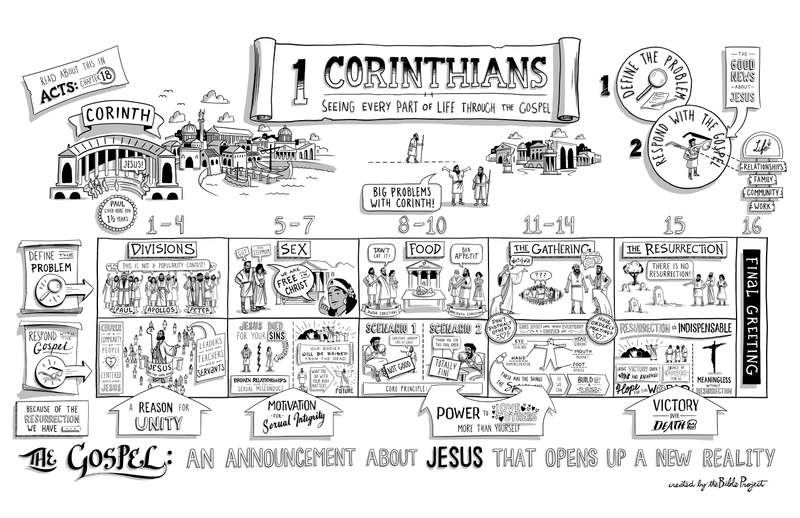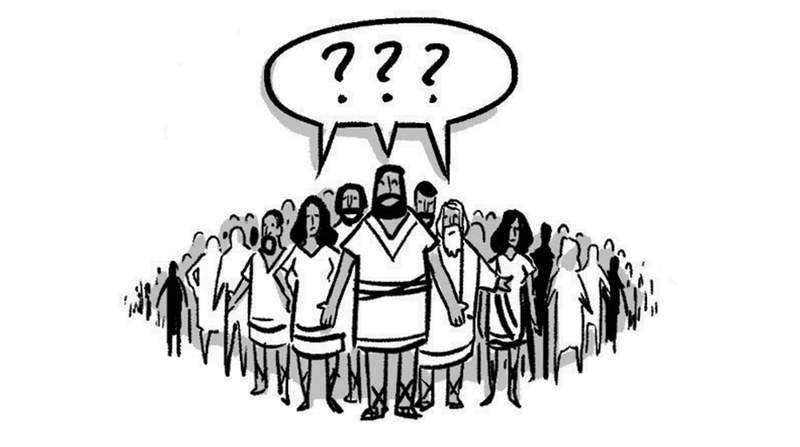The Book of 1 Corinthians
About

1 Corinthians was written to a church community that Paul knew well. Corinth was a major port city in the ancient world with several temples, making it a huge economic-religious center in the Roman world. Paul strategically traveled there as a missionary, spending about a year and a half getting to know the people and telling them about Jesus. Many people there became followers and eventually formed the first church community in the city (Acts 18).
After Paul left to start churches in other cities, he soon began receiving reports of conflict at the church in Corinth. The people were facing all kinds of problems, so Paul wrote this letter to offer guidance, teaching, and encouragement.
The book of 1 Corinthians is broken up into five main parts and a final greeting. The five sections correspond to the five problems Paul addresses, and the letter reads like a collection of short essays. In each section, Paul defines a problem and responds to it with some part of the Gospel story, illustrating how these church members were not actually acting or living out what they said they believed. This pattern of a problem followed by a Gospel solution shows us how Paul is teaching the Corinthians to think as Christians. Following Jesus means developing the skill of seeing all areas of life and relationships through the lens of the Gospel.
1 Corinthians 1-4: Divisions in the Church
In chapters 1-4, Paul defines the problem of divisions in the church. Some other Christian teachers had come through Corinth after Paul, like Apollos and Peter. The problem was that many Corinthians had picked favorites between the three, and people became almost like groupies around these teachers, insulting and disrespecting those who didn’t belong to their group. Paul responds sharply, even sarcastically: “Were you baptized into the name of Paul?!” He wants to make clear that the Church should not give its allegiance to popular teachers but Jesus alone.
The Church is supposed to be a community of people centered around Jesus. Its leaders and teachers are simply servants of Jesus, and while they may prefer one over another, it’s not something worth dividing over. The foundation of this community is not its leaders but Jesus and the good news about who he is and what he’s done.
1 Corinthians 5-7: The Gospel’s Invitation to Sexual Integrity
In chapters 5-7, Paul addresses the problems related to sexual conduct. There were a number of people who were sleeping around in the church, including a guy living with his stepmother. A number of the members were also still worshiping at the local temples to Greek gods and sleeping with the prostitutes there. Even more disturbing to Paul is the fact that many in the church were saying that all this was fine, as if to imply that freedom in Christ means that people can act immorally.
With the Gospel message, Paul shows just how wrongheaded this thinking is. He calls them to remember that Jesus died for the consequences of their sins, which includes the ruin of broken relationships caused by sexual misconduct. If someone is a Christian, sexual integrity and purity is one of the main, nonnegotiable ways to respond to Jesus’ love and grace.

Paul also reminds them that just as Jesus was physically raised from the dead so too will our bodies be raised from the dead. Meaning that if your body is being redeemed by Jesus both now and in the future, then what you do with your body matters. A Christian’s body is not their own to do whatever they want with. It belongs to Jesus and will be raised alongside him, and the body is meant for service to him. Paul is very clear: being a follower of Jesus involves no compromise when it comes to sexual integrity.
1 Corinthians 8-10: Food Sacrificed to Idols
In chapters 8-10, the problem concerns food—but not simply food preferences. The Corinthians were divided on the consumption of meat from animals that were sacrificed in the local temples to Greek and Roman gods. This was likely a split between the Jewish and non-Jewish Christians, and once again, Paul appeals to core ideas from the Gospel. He says that a Christian’s allegiance is to Jesus alone, not to other gods. If you’re in a situation where there’s meat dedicated to another god, there could be people present who will watch you eat the meat and conclude that Christians worship Jesus along with other gods. In that scenario, Paul says, don’t eat the meat. Your loyalty is to Jesus, and you should love those people for whom Jesus died. Don’t mislead them by your own freedom.
Paul does go on to clarify that God is the Creator of all things, including every animal. If there is no one around to misunderstand your intentions, you can eat whether it’s kosher or not. As a new human in Christ, you’re free to follow your conscience in these debatable matters. The qualifying principle that should guide your actions in situations like these is love. Love is a core idea in the Gospel and means denying oneself in order to prioritize the well-being of others. This is the type of love Jesus showed to us, so, Paul says, this is also the kind of love Christians should show to others.
1 Corinthians 11-14: Chaos in Worship Gatherings
In chapters 11-14, Paul addresses problems in the Corinthians’ weekly worship gatherings. People were having powerful spiritual experiences during the gathering and would start praying out loud in unknown languages. There were others who would start sharing a teaching or word from God, and then someone would interrupt them so they could share something with the group. It all became chaotic, distracting people, especially visitors, from hearing the Gospel. Paul helps them first think about the purpose of the gathering and discern what kinds of behaviors are appropriate. He says that the gathering is a place where God’s Spirit can work through everybody, but it should happen in a unified way.
Paul develops a metaphor of the Church as a body. While a body is a single, unified whole, it also consists of different parts that serve unique roles. Paul lists off several things that the Spirit does through people, all for the purpose of building up the Church. He concludes that the highest value to the gathering is a concept that's central to the Gospel, God’s love. Love should compel each person to use their role to serve others.
Paul then applies all of this to the Corinthians’ problems. Some people think the purpose of the gathering is to have intense spiritual experiences or to speak their mind to others. Paul says that while he believes in powerful experiences of prayer, when it distracts or scares people, they should stop. This is an example of loving yourself more than others. The gathering should be orderly so that everyone can learn, worship, and hear God speaking to them in their own language.

1 Corinthians 15: Jesus’ Resurrection and Future Christian Hope
In chapter 15, Paul addresses the final issue of Jesus’ resurrection and the future hope of his followers. Some people in the church were saying that the idea of resurrection is ridiculous and that it doesn’t affect their identities as Christians. Paul has a big reaction to this, saying that the resurrection is an indispensable part of the Gospel. We believe in the resurrection because of the hundreds of eyewitnesses that saw Jesus alive after being publicly executed. If Jesus didn’t rise from the dead, then his death would be meaningless, and we would all still be lost in our sin and selfishness. At that point, we should all just stop being Christians.
Paul goes on to show, in detail, how the resurrection was Jesus’ victory over death and evil as well as a source of life and power for us, promising hope for the entire world. Because of the resurrection, we have a reason for unity in Jesus, motivation for sexual integrity, power to love others more than ourselves, and, ultimately, victory over death.
Paul concludes that believing Jesus was raised from death is the foundation of Christian faith. And the truth of the resurrection means that the Gospel is not merely moral advice or a recipe for private spirituality. It’s an announcement about Jesus that opens up a new reality.
The book of 1 Corinthians is all about seeing every part of life through the lens of the Gospel.

